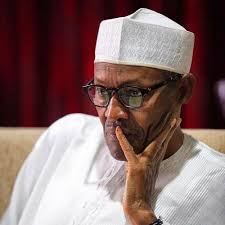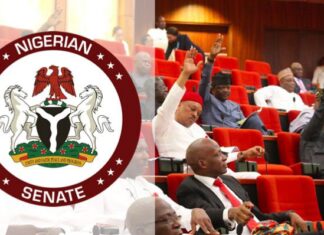General Editor, EMEKA ALEX DURU, writes on frictions within and among organs of the Buhari administration and their impacts on governance.
Not a few analysts are surprised at the uncertain trend of events in Muhammad Buhari’s presidency, barely two years of its inauguration.
If anything, rather, the rancour and in-fighting within and among the various arms of the administration, lend credence to initial fears by critics on the government not being adequately prepared for the huge task of repositioning the country.
Signs of the prevailing uncertainties began to manifest early in the life of the administration. In fact, while the All Progressives Congress (APC) coasted home to victory in the March 28 national and April 11/25, 2015 state elections, perceptive analysts had celebrated the feat with a great deal of caution. Ordinarily, the party’s outing at the polls, had called for rolling out drums in excitement.
For APC, which had come on board, barely a year before the election to rout the Peoples Democratic Party (PDP) that had been in the saddle since the onset of the present democratic dispensation in 1999, there was much to celebrate. It was also the first time, in the nation’s history that a party in opposition was taking power from a ruling party.
On account of these considerable historical landmarks, APC leaders had reasons to prance about. And they actually did, even beating their chests for the rare attainment.
But even as they enthused on their courageous outing, concerned analysts had nursed a hunch on the post-election management of the party’s electoral fortunes. The major concern was that some of the elements that constituted the nucleus of the party, do not have credible antecedents of election victory management.
This, particularly, appeared the greatest undoing of the Alliance for Democracy (AD), that over time, evolved to Action Congress (AC), later Action Congress of Nigeria (ACN) that played major role in the evolution of APC.
Back in the nascent days of the current era, AD, had virtually ran over the politics of the largely Yoruba South West on the mantra of progressive ideology, that critics had actually doubted. But rather than proving its mettle, the leadership of the party got alienated from the electorate, with the result that by 2003, the party had lost out to the rampaging PDP, retaining only Lagos out of six states that were originally in its column. Imposition of candidates and absence of internal democracy, were identified as the factors that primarily worked against the party.
But by 2011, the party had through transformation, metamorphosed into ACN that served as the vehicle for it to regain some lost grounds. The renewed fervor and accompanying good will, also provided the artery for the formation of APC.
Cashing in on the rulership deficit of the PDP, APC easily chanted ‘change’ as its slogan. That, readily fell into the expectations of Nigerians.
Yet there were fears of its leadership being carried away by the allure of victory.
Things fall apart
Signs of chieftains of the APC working at cross purposes began to manifest shortly after the inauguration of the National Assembly, when the leadership, in a manner that was not elaborately explained to even some members, had settled for Ahmed Lawan and George Akume for senate leadership, while Femi Gbajabiamila and Ali Monguno were anointed for the House of Representatives leadership.
The decision however did not go down well with the Bukola Saraki group in the Senate nor the Yakubu Dogara elements in the House. The aggrieved elements who clearly had been schemed out of APC consideration, went into alliance with their PDP colleagues, thus giving rise to Saraki/Ike Ekeremadu victory in the Senate and Dogara emergence in the House.
Ever since the cross-fire, the legislature has literarily been in a battle of wits with the executive and APC leadership. The face-off had manifested in many instances of interaction between the presidency and NASS. In the so-called padding incidence that characterised passage of the budget last year, this lukewarm relationship was easily noticeable.
It is also believed to be the disguised but underlining issue in the controversy over the confirmation of the ambassadorial nominees.
Enter Magu confirmation controversy
But at no time had the frosty relationship been more pronounced as the recent developments involving the non-confirmation of the Acting Chairman of the Economic and Financial Crimes Commission (EFCC), Ibrahim Magu.
Twice, President Buhari had forwarded the name of Magu to the senate, who has been functioning in acting capacity for confirmation. On each occasion however, the lawmakers had turned him down, explaining their action on a report from the Department of State Security (DSS), that had pronounced the acting chairman lacking in integrity required to head the organisation.
The 14-paragraph confidential report said that Magu has failed the integrity test and that if confirmed, he could eventually constitute a liability to the anti-corruption drive of the administration.
The report, among others alleged that Magu is occupying a N20 million per year accommodation, allegedly rented for him by someone under EFCC investigation; lives a flamboyant lifestyle and flouted the President’s order against public officers flying first class when he went on pilgrimage.
Chairman, Senate Committee on Media and Public Affairs, Senator Aliyu Abdullahi read the position of the lawmakers.
Abdullahi said: “The Senate of the Federal Republic of Nigeria wishes to inform the general public that based on security reports available to the Senate; the Senate cannot proceed and confirm the nomination of Ibrahim Magu Mustapha as Executive Chairman of EFCC.
“Accordingly, the Senate hereby rejects the said nomination and has returned the said nomination to Mr. President for further action.”
Magu however put a lie to the DSS report, insisting that none of his actions nor lifestyle had portrayed him as lacking in integrity. He further threw the allegation of integrity deficiency back on the DSS.
His associates have also debunked the accommodation allegation, saying that Magu lives in a house provided for him by the Federal Capital Territory.
Chairman of the Presidential Advisory Committee Against Corruption, Prof. Itse Sagay, also weighed in on the debate, blaming the Senate for refusing to confirm Magu.
He accused the Senators of taking the action purely for selfish reasons and not in the general interest of Nigerians.
“The Senate doesn’t appoint a chairman of the EFCC; what it does is to confirm an appointment. If it doesn’t confirm, then, he will remain acting, he doesn’t become substantive but the powers of acting or substantive chairman are the same; it is just a difference in nomenclature.
“So, any act of bad faith to slow down the corruption war is misplaced and it won’t work. It is sad that people will go to that extent of rejecting what is good for the country for their selfish reasons because they think it is not convenient for them. So this is preference for self-preservation at the expense of the nation and the people of the country”, he was quoted to have said.
Buhari in charge?
Even as critics blame the lawmakers for non-confirmation of Magu, questions of whether Buhari is actually in charge of developments in the administration, have been mooted by concerned observers. This poser gains currency on ground that both the DSS Director-General and EFCC chairman are appointees of the President. Both report directly to him. For one of the agencies to write a damning report on the headship of the other, remains an issue that critics flaunt as indicative of the administration being in disarray.
“This is a clear case of a divided house. It shows an administration lacking in harmony. How can the DSS Director-General who was appointed by the President, allow a damning report on a nominee from the same man that appointed him? Is it not akin to an employee waging war against his employer? Was it that the President, even with his famed military background, did not run the necessary checks on Magu before nominating him for the job? The entire thing is confusing. As I said earlier, it is a clear case of a divided house – something closely to a popular television show, Fuji house of commotion”, volunteered a Senior Lecturer in Department of History and International Relations, Lagos State University, Ojo.
“Alli must go campaign” kicks off
The heat generated by the Magu confirmation controversy was yet to die down when another face-off involving the senate and executive arm of the government broke out. At the centre of the running battle, is the Comptroller-General of Customs, Colonel Hameed Alli, over appearing on Customs uniform in answering to summons from the lawmakers to appear before them.
The senators had invited Alli to appear before it to explain the recent controversial directive by the Customs on vehicle owners in the country to report to designated points to verify payment of customs duties on their vehicles or do so, within a specific period to avoid the vehicles being impounded by operatives of the agency.
While the customs rolled out the directive, Nigerians rose in anger, especially over the retroactive dimension of its implementation. In a bid to get to the root of the matter, the lawmakers directed Alli to suspend the directive and appear before them to explain the rationale behind the action. It was in the process that the senators insisted that the Customs CG must appear before them in uniform.
Alli however scoffed at the directive, arguing that having served in the military, he found no need putting on customs uniform on retirement. Bent on his position, the CG honoured the senate invitation penultimate Wednesday but failing to appear on uniform, the lawmakers walked him out. An instruction on him to make a repeat appearance before the lawmakers last Wednesday, was not kept. The CG explained his refusal on advice from the Attorney-General and Minister for Justice. The lawmakers however would not accept the explanation but went ahead to ask him to resign. Alli has not resigned. And may not.
The action has ever since, triggered a wave of reactions from commentators. Senior lawyer, Femi Falana (SAN), accused the senate of beating about the bush in insisting that Alli must appear before it on uniform. Former Aviation Minister, Femi Fani-Kayode, however disagrees, seeing the Alli posture as gross disrespect to the institution of the senate and Nigerians at large.
Nnamdi Okosieme, cerebral journalist, also injected an insightful angle to the debate, stressing that no matter the opinion any person or group may have of the senators, they were elected by Nigerians and should be allowed to function.
“Those cheering Hameed Alli and his outsized ego and trying to diminish the Senate, are actually poking fingers into their own eyes.
“Our Senators may be a reflection of the bad choices we have made. We put them there; they didn’t sneak in via the back door and if we are tired of them, we should do the needful and send them back whence they came.
“Bad as we may think our Senators are, they are there for a purpose; we can question their actions but we certainly do not have the liberty of trying to destroy the institution itself. No individual, no matter how loved or pious, should be allowed to rise above the Senate. Individuals come and go but that institution called the Senate must remain to serve as a check on the excesses of government.
“So, if Ali is too big to humble himself before the people’s representatives, he is actually disdaining the people who put them there; for as long as Nigerians allow the Senators to remain in that hallowed chamber, they (the Senators) represent and speak for Nigerians”, he wrote on his social media Facebook page, last Thursday.
By the close of last week, not much was heard from the presidency on the raging controversy. But it adds to the impression by Nigerians of the officials and organs of the administration working at cross purposes.
- Advertisement -
- Advertisement -











